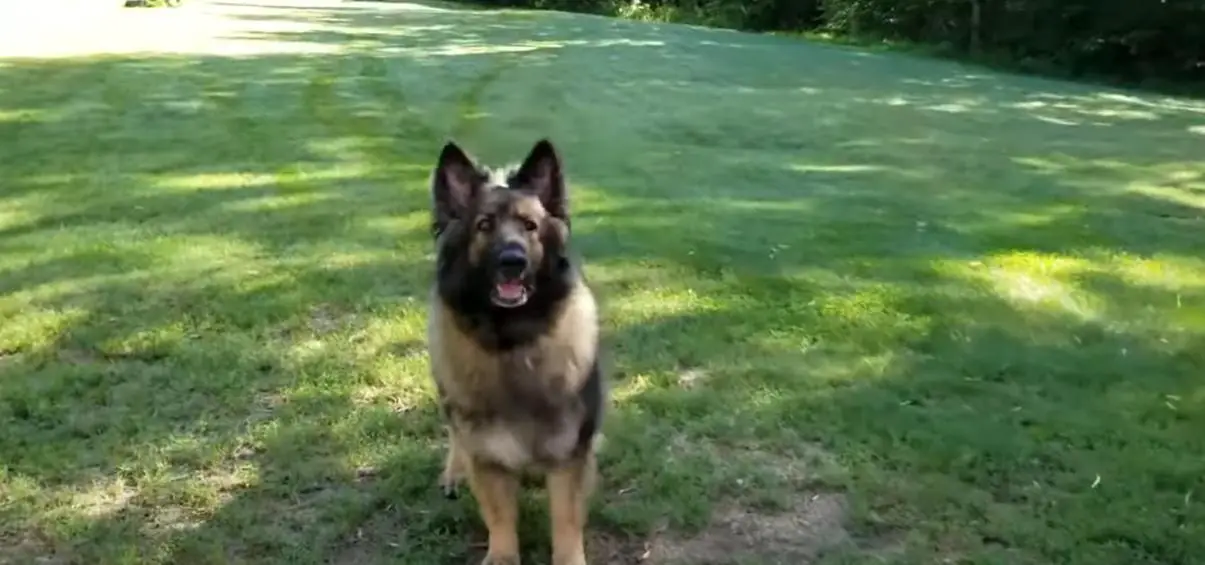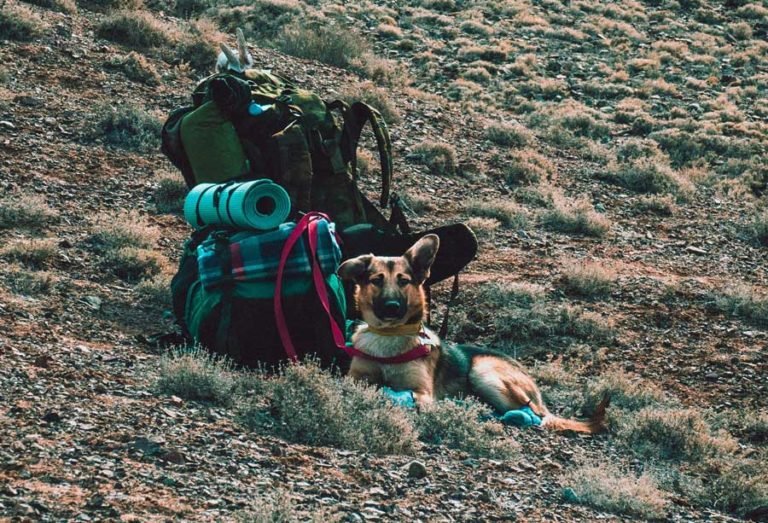Are German Shepherds Outside Dogs? (Discover The Facts)
No, German Shepherds are not meant to be outside dogs. They should spend most of their time indoors with their family. This is because they are very social animals and need human interaction in order to thrive.
Additionally, they are not well-suited for the outdoors because they are not built for extreme weather conditions. They can suffer from heatstroke in warm weather and frostbite in cold weather.
So, if you’re thinking about adopting a German Shepherd, be prepared to have them as an indoor dog who is a part of your daily life.
 german shepherds“/>
german shepherds“/>Why are German Shepherds not meant to be outside dogs?
German Shepherds are not meant to be outside dogs because they cannot regulate their body temperature.
Puppies are especially vulnerable to temperature changes and drafts outside, which can be potentially dangerous.
German Shepherds rely on their owners to provide them with a safe and warm environment where they can thrive.
What are the consequences of making a German Shepherd an outside dog?
German Shepherds are a very popular breed of dog, known for their loyalty and intelligence. They are also one of the most common breeds used as working dogs in a variety of fields, including law enforcement and the military.
However, German Shepherds are not typically considered an “outside” breed of dog. This is because they are very attached to their owners and may become agitated or anxious if left alone for extended periods of time.
While it is possible to make a German Shepherd an outside dog, it is not recommended. If the weather is appropriate and their other needs are met, leaving a German Shepherd outside for an occasional night will not cause them any harm.
However, making a German Shepherd an outside dog on a regular basis can lead to a number of problems. First, as mentioned above, German Shepherds can become anxious or agitated when left alone for too long. This can lead to barking or howling, which can be disruptive to your neighbors.
Additionally, German Shepherds who spend too much time outdoors can become bored or restless, leading to destructive behaviors such as chewing on furniture or digging holes in your yard.
So while there are no severe consequences to making a German Shepherd an outside dog on occasion, it is not ideal for either the dog or the owner.
If you do decide to leave your German Shepherd outdoors regularly, be sure to provide them with plenty of toys and activities to keep them occupied and happy.
How can you make a German Shepherd an indoor dog?
A German Shepherd can make a great indoor dog if you are willing to put in the time and effort to properly train and exercise them. German Shepherds are bred as working dogs and need a lot of physical and mental stimulation.
A well-rounded training program for a German Shepherd should include socialization, obedience training, and exposure to different environments.
If you can provide your German Shepherd with enough physical and mental stimulation, they will be happy living inside with you.
What is the difference between an inside and outside dog?
There are a few key differences between inside and outside dogs. First, inside dogs are less likely to have behavioral problems. This is because they are used to being around people and other animals, and they know that there is always someone nearby who can provide them with attention or help if needed.
Outside dogs, on the other hand, can become stressed or anxious when left alone. This is because they are not used to being away from their pack (ie, their family), and they may not have as much social interaction with other animals or people.
Additionally, outside dogs may be more prone to getting into fights with other animals, as they are not used to sharing their space. Finally, outside dogs may also be more likely to develop separation anxiety than inside dogs.
Is it possible to have an inside dog if you live in an apartment?
Many people believe that you cannot have an inside dog if you live in an apartment, but this is not necessarily true.
An apartment can offer enough space to have a separate room or area for your dog. The kitchen is often the preferred space for an inside dog, due to its easy-to-clean floors. If the kitchen does not have a door, baby gates are an effective way of keeping the dog in place.
German shepherds are a popular breed of inside dogs, as they are very obedient and trainable. With proper care and attention, any type of dog can thrive in an apartment setting.
How much time should you spend with your German Shepherd each day?
German Shepherds are one of the most popular dog breeds in the world. They’re known for their loyalty, intelligence, and strength.
But like all dogs, they need plenty of exercise and socialization to stay happy and healthy. So how much time should you spend with your German Shepherd each day?
The general rule of thumb is that dogs should get a minimum of two hours of dedicated social time with humans or other dogs every day.
This can be broken up into shorter chunks throughout the day, but it’s important that your dog has regular opportunities to interact with people and other animals.
For German Shepherds specifically, this means plenty of time spent playing fetch, going for walks or runs, visiting the dog park, or just hanging out together on the couch. The more interactive and varied their days are, the happier they’ll be.
Can German Shepherds be left alone for long periods of time?
German Shepherds are a versatile breed of dog that can adapt to many different lifestyles. However, when it comes to being left alone for long periods of time, there are some things you should take into consideration.
First and foremost, German Shepherds are social creatures that thrive on companionship. They are not meant to be left alone for extended periods of time and will often become anxious or depressed if left by themselves for too long.
That being said, German Shepherds can be left home alone for up to 4 hours maximum. Puppies should not be left home alone for longer than one hour for each month of age.
If you must leave your German Shepherd home alone for an extended period of time, there are some things you can do to make the experience more bearable for them.
First, try to schedule your absences around times when your dog is usually sleeping or resting. This will help minimize the amount of time they’re actually alone.
Secondly, make sure they have plenty of toys and activities to keep them occupied while you’re gone. This could include chew toys, food puzzles, or even just a simple Kong toy filled with their favorite treats.
Lastly, provide them with plenty of love and attention before and after your absence so they know that they are still loved and valued despite being left alone briefly.
In conclusion, German Shepherds can technically be left home alone for up to 4 hours at a time; however, puppies should not be left unsupervised for longer than 1 hour per month old they are.
What happens if you don’t spend enough time with your German Shepherd?”
If you don’t spend enough time with your German Shepherd, it may become anxious or depressed. It may also start to exhibit destructive behaviors, such as chewing on furniture or barking excessively.
Without proper socialization and attention, a German Shepherd may become aggressive toward people or other animals.
A German Shepherd needs plenty of social interaction and attention from their owner in order to stay happy and healthy.
If they don’t get enough time with their favorite person, they can start to suffer from anxiety or depression. This can lead to destructive behaviors like chewing on furniture or excessive barking.
Additionally, without proper socialization, a German Shepherd may become aggressive toward people or other animals.
Frequently Asked Questions
Can you keep German Shepherds outside?
German Shepherds are one of the most popular dog breeds in the world. They are known for their loyalty, intelligence, and trainability. German Shepherds are also a working breed and are often used as police dogs, service dogs, and rescue dogs.
German Shepherds can live outside with appropriate shelter and if the temperature is moderate. However, they are very attached to their human companions and need a lot of social interaction to prevent unwanted behaviors from developing.
If you decide to keep your German Shepherd outside, make sure you provide them with a warm, dry place to sleep and plenty of toys and chew bones to keep them occupied.
Do German Shepherds like being outside?
Yes, German Shepherds can benefit from being left outside for short periods of time during the day. Many GSDs actually prefer to be outside a lot of the time, as it is good for their emotional and physical well-being.
Being outside allows German Shepherds to stretch their legs and explore their surroundings. It also provides them with much needed mental stimulation, as they are able to take in all the sights and smells around them. Additionally, being in nature can help reduce stress levels and provide a sense of calmness.
Of course, it is important to make sure that your GSD has access to shade and water when spending time outdoors. Also, be sure to monitor your dog closely if you live in an area with extreme weather conditions (e.g., very hot or cold temperatures). If your dog does not seem to be enjoying himself or appears uncomfortable, bring him inside immediately.
Are German Shepherds indoor or outdoor?
The German Shepherd is happiest living indoors with the family, but with access to a large, fenced yard. This breed does best when given plenty of space to run and play, and a backyard is a perfect place for them to do just that.
However, German Shepherds can also be successful indoor dogs if they are given enough exercise and attention from their owners. If you’re considering adding a German Shepherd to your family, be sure to have plenty of space – both inside and out – for your new furry friend.

